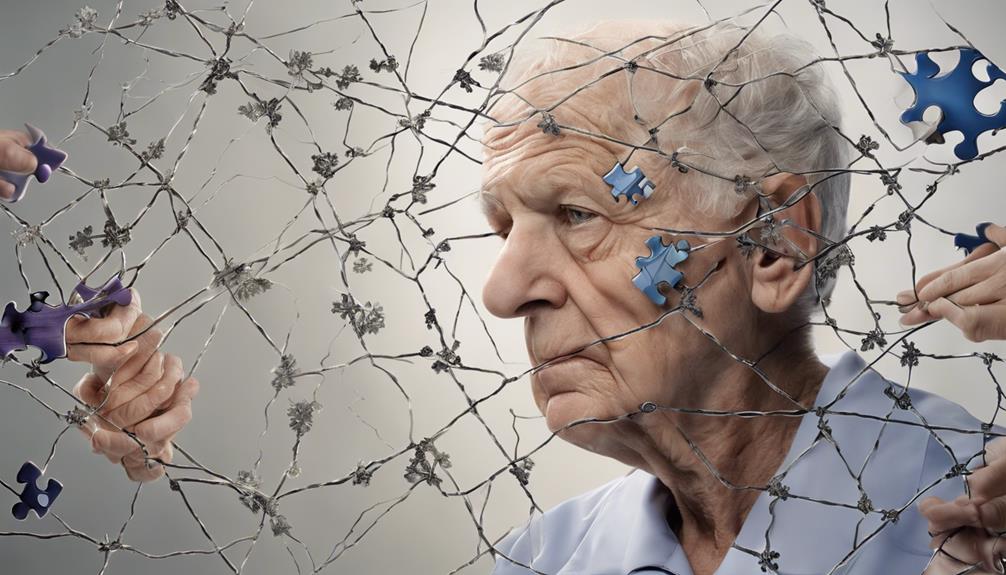Have you ever paused to consider the intricate ways in which our actions can mirror our cognitive health?
Alzheimer's disease, a condition that affects millions globally, can manifest in various ways, one of which is through nose picking.
This seemingly innocuous habit can hold deeper significance in the context of Alzheimer's, shedding light on the complexities of the condition and its impact on individuals and their caregivers.
Understanding the underlying reasons behind this behavior is crucial in offering appropriate support and care.
Key Takeaways
- Nose picking in Alzheimer's linked to cognitive decline and social challenges.
- Caregivers face safety concerns, communication difficulties, and caregiver stress.
- Strategies involve alternative activities, safe environments, and positive reinforcement.
- Communication approaches include eye contact, simple language, and collaboration with professionals.
Understanding Alzheimer Nose Picking

Exploring the neurological mechanisms behind Alzheimer nose picking reveals intricate connections between cognitive decline and behavioral manifestations. In individuals with Alzheimer's disease, the progressive deterioration of brain regions involved in executive functions and impulse control can lead to the development of compulsive behaviors such as nose picking. The prefrontal cortex, responsible for decision-making and inhibition, shows significant atrophy in Alzheimer's patients, contributing to a loss of control over impulsive actions.
Moreover, alterations in neurotransmitter systems, particularly dopamine and serotonin, play a crucial role in the manifestation of compulsive behaviors like nose picking. Dysregulation of these neurotransmitters can disrupt the balance between reward-seeking and inhibitory pathways, further exacerbating compulsive tendencies.
Understanding the intricate interplay between neuroanatomical changes and neurotransmitter dysregulation in Alzheimer nose picking is essential for developing targeted interventions to manage these challenging behaviors effectively. By addressing the underlying neurological mechanisms, caregivers and healthcare professionals can provide more personalized care and support to individuals living with Alzheimer's disease.
Impact on Daily Functioning

When considering the impact of Alzheimer nose picking on daily functioning, it's essential to evaluate its effects on memory and cognition.
Memory loss associated with Alzheimer's can exacerbate the behavior, leading to repetitive actions like nose picking.
Furthermore, the social interactions of individuals engaging in this behavior may be affected, potentially causing discomfort or misunderstanding in various social settings.
Memory and Cognition
Our research indicates that cognitive decline in individuals with Alzheimer's disease significantly impairs their ability to perform daily tasks. Memory and cognition play a crucial role in our daily functioning, affecting tasks such as decision-making, problem-solving, and communication. As cognitive abilities decline, individuals may struggle with remembering appointments, following instructions, and even recognizing familiar faces. This decline in cognitive function can lead to increased dependence on others for assistance with basic activities of daily living. Below is a table illustrating the impact of memory and cognition on daily tasks:
| Daily Task | Impacted Cognitive Function |
|---|---|
| Managing finances | Executive function |
| Cooking meals | Memory and problem-solving |
| Engaging in hobbies | Attention and planning |
Social Interactions
Social interactions in individuals with Alzheimer's disease are significantly impacted by their cognitive decline, leading to challenges in daily functioning. As the disease progresses, individuals may exhibit changes in behavior, such as social withdrawal, disinhibition, or inappropriate responses. These alterations can make it difficult for them to engage in conversations, maintain relationships, or participate in social activities.
Moreover, memory loss and confusion may lead to repetitive questioning, difficulty following discussions, or even forgetting familiar faces. Caregivers and healthcare professionals play a crucial role in supporting individuals with Alzheimer's to navigate social interactions effectively.
Strategies such as maintaining a calm environment, using simple language, and providing prompts can help improve communication and enhance the quality of social interactions for individuals with Alzheimer's disease.
Behavioral Triggers and Patterns

When examining behavioral triggers and patterns in individuals with Alzheimer's, we focus on trigger identification techniques and the management of behavior changes. Identifying triggers involves observing cues that lead to specific behaviors, enabling us to intervene effectively.
Trigger Identification Techniques
Identifying behavioral triggers and patterns in individuals with Alzheimer's disease involves meticulous observation and analysis of recurring actions and stimuli. This process is crucial for understanding and managing challenging behaviors.
Here are three techniques to help identify triggers effectively:
- Keep a detailed log of behaviors: Documenting the time of day, environment, activities, and reactions preceding certain behaviors can reveal patterns.
- Conduct structured observations: Setting up specific times to observe behavior in a controlled environment can provide valuable insights.
- Engage with caregivers and family members: Collaborating with those who spend significant time with the individual can offer different perspectives and help identify triggers that may have been overlooked.
Managing Behavior Changes
To effectively manage behavior changes in individuals with Alzheimer's disease, understanding and addressing behavioral triggers and patterns is essential for providing appropriate care and support. By recognizing specific triggers that lead to challenging behaviors, caregivers can implement strategies to prevent or minimize these occurrences.
Monitoring patterns in behavior can help identify potential triggers, allowing for proactive interventions. It's crucial to establish routines and environments that promote a sense of familiarity and security, as changes in these elements can often trigger distress or agitation.
Additionally, maintaining open communication with healthcare professionals and keeping detailed records of behaviors and their triggers can aid in developing personalized care plans that effectively manage behavior changes associated with Alzheimer's disease.
Psychological Effects on Individuals

The psychological effects of Alzheimer's disease on individuals can be profound and far-reaching, impacting cognitive function, emotional well-being, and quality of life.
- Cognitive Function: Alzheimer's can lead to memory loss, confusion, difficulty with problem-solving, and challenges in language and communication. These cognitive impairments can be distressing for individuals as they struggle to remember familiar faces, places, or even their own identity.
- Emotional Well-being: Individuals with Alzheimer's may experience mood swings, anxiety, depression, and feelings of frustration or agitation due to their cognitive decline. Coping with these emotional changes can be overwhelming and may require support from caregivers and healthcare professionals.
- Quality of Life: The progressive nature of Alzheimer's disease can significantly impact an individual's overall quality of life. As the condition advances, individuals may struggle to perform daily tasks, maintain social connections, and engage in activities they once enjoyed, leading to a decline in their overall well-being. It's essential to provide compassionate care and support to enhance the quality of life for individuals living with Alzheimer's.
Challenges for Caregivers

Moving from the psychological impact on individuals to the challenges faced by caregivers in Alzheimer's disease care, the demands and complexities of providing support become increasingly evident. Caregivers of individuals with Alzheimer's face a multitude of challenges, ranging from managing challenging behaviors to ensuring safety and providing emotional support. The table below highlights some of the key challenges that caregivers may encounter:
| Challenges Faced by Caregivers | Description |
|---|---|
| Behavioral Symptoms | Agitation, aggression, wandering |
| Communication Difficulties | Difficulty in expressing needs and emotions |
| Care Coordination | Managing appointments and medications |
| Caregiver Stress | Emotional and physical strain |
| Safety Concerns | Preventing falls, accidents, and wandering |
Understanding and addressing these challenges is crucial for caregivers to provide effective care for individuals with Alzheimer's. Implementing strategies to manage these challenges can help improve the quality of life for both the caregiver and the individual receiving care.
Strategies for Managing Nose Picking

When addressing nose picking in individuals with Alzheimer's disease, practical strategies involving redirection and environmental modifications can be effective in managing this behavior. Nose picking can be a challenging behavior to address, but with the right approach, caregivers can help individuals with Alzheimer's navigate this issue.
Here are three strategies that can be beneficial in managing nose picking:
- Provide alternative activities: Engage the individual in activities that keep their hands busy, such as holding a soft toy or fidget spinner. Redirecting their focus to these activities can help reduce the urge to pick their nose.
- Create a soothing environment: Ensure that the environment is calm and comfortable to minimize stress and anxiety, which can sometimes trigger nose picking. Soft music, pleasant scents, and comfortable seating can contribute to a relaxed atmosphere.
- Use positive reinforcement: Encourage and praise the individual when they refrain from nose picking. Positive reinforcement can help reinforce good behavior and motivate them to continue practicing it.
Addressing Safety Concerns

Addressing safety concerns related to nose picking behaviors in individuals with Alzheimer's disease involves implementing measures to prevent harm and ensure a secure environment for the individual. One critical aspect is conducting a thorough assessment to identify triggers or patterns that lead to nose picking. This assessment can help in devising personalized strategies to minimize the behavior.
To ensure safety, it's essential to create an environment that reduces the risk of injury. This includes keeping the individual's nails trimmed short to prevent any potential harm from nose picking. Additionally, providing sensory stimulation through fidget toys or textured surfaces can redirect the individual's attention away from nose picking.
Regular supervision is paramount to intervene promptly if nose picking occurs. Caregivers should be trained to gently redirect the individual's hand away from the nose without causing distress. Implementing a consistent daily routine can also help reduce anxiety and minimize the likelihood of nose picking episodes. By addressing safety concerns proactively, caregivers can create a secure environment that promotes the well-being of individuals with Alzheimer's disease.
Communication Approaches and Support

In facilitating effective communication with individuals with Alzheimer's disease, employing personalized approaches tailored to their cognitive abilities and preferences is crucial for fostering meaningful interactions. Understanding the unique needs of each individual can significantly enhance communication outcomes.
Here are three practical strategies to improve communication and provide support:
- Maintain eye contact: Establishing and maintaining eye contact can help individuals feel more connected and engaged during conversations. It shows attentiveness and can aid in capturing their focus.
- Use simple language: Avoiding complex sentences and using straightforward language can assist in conveying information more effectively. Clear and concise communication reduces confusion and enhances comprehension.
- Encourage non-verbal communication: Non-verbal cues such as gestures, facial expressions, and touch can supplement verbal communication and help convey emotions and intentions more clearly. Being attuned to non-verbal signals can enrich interactions and foster a deeper connection with individuals with Alzheimer's disease.
Seeking Professional Guidance

To further enhance the care and support provided to individuals with Alzheimer's disease, consulting with healthcare professionals specializing in geriatric care can offer valuable insights and tailored strategies for managing the challenges associated with the progression of the disease. These professionals possess specialized knowledge in the complexities of Alzheimer's disease and can provide comprehensive assessments to identify specific needs and develop personalized care plans.
When seeking professional guidance for individuals with Alzheimer's disease, it's essential to collaborate with a multidisciplinary team that may include geriatricians, neurologists, psychiatrists, occupational therapists, and social workers. This team-based approach ensures a holistic assessment of the individual's physical, cognitive, and emotional well-being, leading to a more integrated and effective care plan.
Additionally, healthcare professionals can offer guidance on medication management, behavior modification techniques, communication strategies, and caregiver support services. By tapping into the expertise of these professionals, caregivers and family members can gain a deeper understanding of Alzheimer's disease and learn how to navigate its challenges with confidence and compassion.
Frequently Asked Questions
Can Alzheimer's Nose Picking Behavior Be Completely Eliminated With Treatment?
Yes, Alzheimer's is a complex condition that affects various behaviors, including nose picking. Treatment options aim to manage symptoms rather than completely eliminate behaviors.
Interventions like behavioral therapy, medication, and environmental modifications can help reduce nose picking tendencies in Alzheimer's patients.
It's crucial to work closely with healthcare professionals to develop a comprehensive care plan that addresses the individual's needs and promotes their well-being.
Are There Any Specific Medications That Can Help Reduce Nose Picking in Individuals With Alzheimer's?
Yes, there are medications that can help reduce nose picking in individuals with Alzheimer's. These medications primarily focus on addressing the underlying causes of the behavior, such as anxiety or obsessive-compulsive tendencies.
How Does Nose Picking Behavior in Alzheimer's Patients Differ From That in Individuals Without the Disease?
When comparing nose picking behavior in Alzheimer's patients to individuals without the disease, we notice distinct differences. The frequency and intensity of nose picking tend to be higher in those with Alzheimer's due to cognitive decline impacting inhibition control.
This behavior can be challenging to manage, requiring tailored interventions and understanding. By recognizing these differences, we can better support individuals with Alzheimer's and improve their quality of life.
Are There Any Long-Term Consequences of Chronic Nose Picking in Alzheimer's Patients?
Long-term consequences of chronic nose picking can include damage to the nasal passages, increased risk of infections, and potential scarring. Continuous picking may lead to irritation and inflammation, causing discomfort and disrupting nasal functions.
It's crucial to address this behavior promptly to prevent complications. Proper care, such as using saline sprays or seeking medical advice, can help manage the habit and mitigate the risk of adverse outcomes.
Is There a Genetic Predisposition for Nose Picking Behavior in Individuals With Alzheimer's?
Yes, there's evidence suggesting a genetic predisposition for certain behaviors in individuals with Alzheimer's. Research indicates that genetic factors play a role in shaping various aspects of behavior, including those related to neurological conditions.
Studies have identified specific gene variants that may influence behavioral traits in Alzheimer's patients. Understanding these genetic predispositions can provide valuable insights for developing targeted interventions and personalized care strategies for individuals with Alzheimer's.
How does Nose Picking Relate to Alzheimer’s and Why is it Important for an Alzheimer’s Phone to Have Certain Features?
Nose picking has been linked to the risk of Alzheimer’s disease. Therefore, it is essential for an Alzheimer’s phone to have features like simplified interface and emergency call buttons for the safety and convenience of those suffering from the condition. Properly designed alzheimer’s phone features can greatly improve the quality of life for patients.
Conclusion
In conclusion, managing Alzheimer nose picking can be challenging for both individuals and caregivers. While some may argue that this behavior is trivial, the psychological impact on those affected can't be overlooked.
Imagine the distress of not being able to control this compulsion, leading to embarrassment and frustration. Seeking professional guidance and implementing effective strategies are crucial in addressing this issue and improving the overall quality of life for individuals with Alzheimer's disease.









